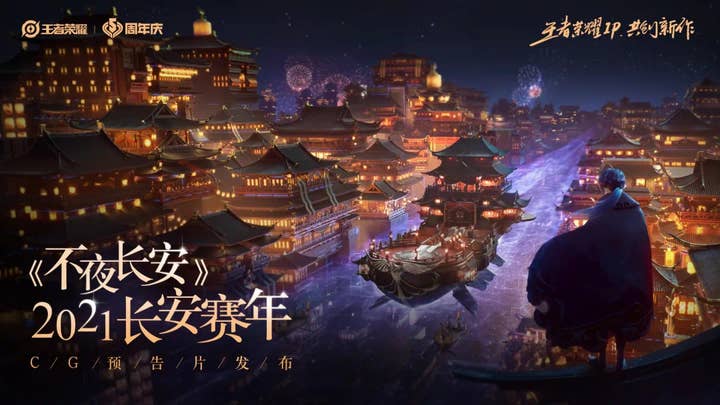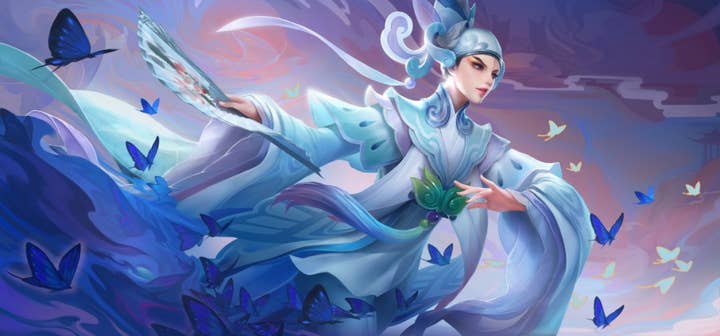Honor of Kings foresees a borderless, mobile future
TiMi Studios' Vincent Gao and Li Min explain why the company is making games for the players of tomorrow, not today
Despite being one of the most popular and highest-grossing games of all time, still topping mobile revenue charts five years after launch, Honor of Kings (also known under its Western release title, Arena of Valor) hasn't gotten quite the media buzz overseas that its revenue numbers might imply.
Some of this might be attributed to the fact that awareness of Chinese-developed games has only recently been on the rise in Western markets despite the massive numbers of players and spending involved, with titles like Pascal's Wager and Genshin Impact bringing considerable buzz in 2020.
Speaking to GamesIndustry.biz via email, TiMi Studios international director Vincent Gao attributes the recent interest in Chinese games in the West to the considerable growth that the development scene in China has seen in recent years.
"It's wholly driven by the market," he says. "The world-leading mobile game market leads to world-leading mobile game development investment. As a result, Chinese game makers now have a competitive development capability in the globalized market."
"It's far more important for game developers, no matter where they come from, to understand 'the future' than 'the West' or 'the East'"
Vincent Gao
However, despite somewhat of an international divide existing in the past, Gao says that TiMi Studios and Tencent don't really think about game design as something divided by national boundaries. He says that the games market is globalized, and that good games "transcend borders."
"It's far more important for game developers, no matter where they come from, to understand 'the future' than 'the West' or 'the East,'" he says. "In order to gain a bigger chance of success, you have to make games that players feel are one step ahead of the best game on the current market. Games like this have to solve a lot of issues which are considered worldwide challenges regarding design, production, and technology. And games like this will likely lead the direction of the whole industry. For game makers like us, it's always been our dream. It's also the direction TiMi Studios strives hard to pursue.
"Second, the industry has entered an era where game makers compete for the highest global quality standard. With 12 years of game development experience, TiMi has gained tremendous competitive experience in the globalized mobile gaming value chain.
"So I think two factors, exploration of the market's future needs and quality production, among others, are the most important factors to determine whether or not a game might be a success. The origin of the game developers is irrelevant."

However, Gao does acknowledge that platform differences are important for TiMi to take into account when looking to release new titles globally. Specifically, he points out that the majority of gamers in China are on mobile, while in the West console and PC are dominant. Even so, he adds, this separation is gradually disappearing.
"Looking ahead to the future, what we see in the West is that younger audiences are native to mobile and expect more from mobile games," Gao says. "We want to create mobile games for these audiences expecting more than the casual games that have largely led the way in Western mobile game development. This is the future we see in the West for the long run."
Honor of Kings game director Li Min also pointed out that Tencent and TiMi's technical prowess in the mobile space were critical to Honor of Kings' success -- particularly in the context of bringing the traditionally PC-based MOBA genre to handheld devices.
"We have been able to modernize some of the most famous lore in our country... Our game has created a historical renaissance among Chinese players"
Li Min
"Honor of Kings was one of the first games in the world to make some important technical solutions for mobile game development, including frame synchronization, optimization for mobile networks, non-synchronous coloring, frame synchronization recovery after disconnection, and other technologies to support mega-systems for hundreds of millions of users," he says. "There were no prior examples to follow. We're really proud that our developed technology for PvP combat now benefits nearly all of Tencent's PvP games. We're seeing an accelerated R&D process because development teams aren't starting from zero."
The idea of developing games with the technology of the future in mind is something both Gao and Min keep at the heart of our discussion. Min shares that Honor of Kings was launched five years ago with less than 100 employees, and now has more than 400 people and 100 teams across the company directly supporting the game. The extra resources over time have helped fuel the team's creative capacity, especially with regards to its inclusion of local culture.
"We're quite proud that we've helped deliver an uptick in the game's literary value," Min says. "We have been able to modernize some of the most famous lore in our country both in and around the game -- it's something we've seen players enjoy. We are proud that our game has created a historical renaissance among Chinese players.
"That's also motivated us to take the game writing and IP building more seriously. We now have plans to expand the Honor of Kings IP into new genres and several new mediums, including animated features and shows, stage shows and even film."

Min is also proud of how Honor of Kings has grown into an esport, saying that this is a realm the company is heavily invested in.
"We're not only trying to improve our professional league, the King Pro League, but we're also striving to create a wider and deeper esports infrastructure so everybody can compete in Honor of Kings esports," he continues. "Improvements like this will increase the influence of our top-tier tournaments and create a robust ecosystem for all."
"There's a lot of room for improvement in the global mobile gaming markets. There are a lot of unmet needs of mobile gamers"
Vincent Gao
Min points out that another component of Honor of Kings' success from the get-go was its timing, coinciding with trends like the widespread adoption of 4G and more powerful smartphones. Now, he says, new tech is coming that will help improve their prospects even further, which Min hopes results in a game that will ultimately outlast him -- being played across multiple generations.
"Looking ahead, technologies like VR, AR, and XR will continue to mature," Min says. "5G and cloud gaming will bring new challenges and opportunities to the industry. Technology and society will change. Our job as content makers remains the same. First, we have to provide players with a good emotional experience by shaping resonance with the game's world. Second, we have to gather a team who share the same vision and interests, and let them continuously grow and excel in the areas of their expertise."
Honor of Kings is not TiMi or Tencent's only success by any stretch, of course -- Call of Duty: Mobile comes to mind. Gao says that's because the studio's philosophy of developing for future trends, technologies, and players extends across the portfolio, and continues to inform ongoing business plans as well as creative visions.
"There are certain trends you have to plan ahead for to have the right game at the right time," he says. "One of the key trends we see now is that you need to strive to make games that reach a high bar with quality and fidelity, especially when you are making mobile games. There's a lot of room for improvement in the global mobile gaming markets. There are a lot of unmet needs of mobile gamers, and those needs will only increase with the advancement of technology."
Gao considers the question that there might be other game genres not currently prevalent on mobile that may be a good fit for the platform down the line as technology improves. While he doesn't name any specific examples, he does think that further mobile advances will continue to shift the global games market.
"A lot of new technological solutions will be driven by the needs of future players, determined by how game developers envision the global mobile market. For example, we developed several important mobile combat technology solutions for Honor of Kings, significant technological breakthroughs ahead of their time. TiMi Studios has always been looking ahead, and has built its development capabilities according to technology trends and future player needs."

